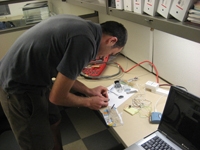
School:
Grade Level:
Teaching Position:
Supervisor:
Department:
Mentor:
Research Project Year:
Research Project Title:
Research Project Description:
Top predators play a significant role in all ecosystems because their numbers and behaviors influence the structure and function of all of the organisms below them on the food chain. Community ecologists have long studied the importance of predators in ecosystems by examining the consumptive impacts that predators have on their prey populations. However, the consumptive aspect of the relationship between predators and prey provides a narrow and overly simplistic understanding of the impacts that predators have on their prey.
Due to the dominance of the "consumptive" paradigm in ecological studies, the non-consumptive effects of predators on prey have been over-looked and under-studied. The stress on prey organisms resulting from the mere presence of a predator can have significant impacts on prey. These non-consumptive effects include alterations in prey behavior, including feeding, reproduction events, changes in physiology, morphology, etc. Recently, researchers have found that consumption in the intertidal ecosystem that delicately straddles the boundary between the land and sea increases as temperature increases.
These results suggest that the increased temperatures resulting from global climate change may significantly impact intertidal ecosystems as top predators increase their consumption.
However, predators' non-consumptive effects on their prey may not be altered by temperature in the same direct way or to the same scale as consumptive effects. To examine the importance of temperature to non-consumptive effects of predators in the intertidal we examined the predator-prey relationships between the seastar Pisaster ochraceus and the ubiquitous mussel Mytilus californianus and between the rock whelkNucella emarginata and Mytilus californianus.
Curriculum Project Year:
Curriculum Project Title:
Curriculum Project Description:
Resources for field trips are in short supply, many classroom supplements and videos don't address the state standards. My project uses a series of digital shorts to give students access to university researchers in a vibrant field setting while addressing the relevant CA state ecology standards through the study of tide pools. Each video segment is accompanied by hands-on classroom activities. For videos - please search "Life in Between the Tides" from the youtube channel "Materialsresearchlab" (5 seperate parts of videos).
Curriculum Project Attachments:
| Attachment | Size |
|---|---|
| 14.37 MB | |
| 476.26 KB | |
| 7.26 MB | |
| 765.42 KB | |
| 323.68 KB | |
| 279.54 KB |
